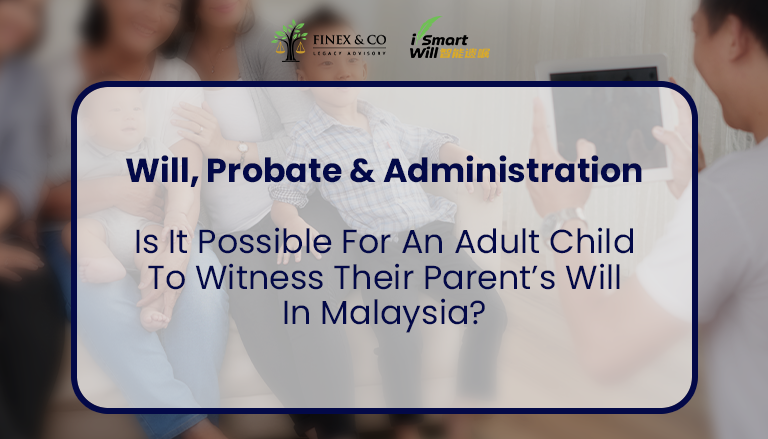Have you ever wondered if an adult child is eligible to act as a witness to their parent’s will?
Consider this scenario: a mother prepares a will giving all assets to her son and asked her 20-year-old daughter to sign as a witness. Since the daughter is neither a beneficiary nor entitled to any inheritance under the will, does this make her eligible to take on the role? Does this make her eligible to witness the will? What do you think?
Law
According to the Wills Act 1959, a person who is 18 years of age and of sound mind can act as a witness to a will. However, a crucial requirement is that the witness must not be a beneficiary of the will or married to any beneficiary provided she is not named as a beneficiary in the will. If they are, any gift or inheritance intended for them would be rendered invalid. That said, if a child is not entitled to receive anything under the will, they are legally permitted to act as a witness.
For example, a 20-year-old daughter can validly witness her mother’s will, provided she is not named as a recipient of any inheritance.
Why Is a Witness Important?
When you witness a will, it’s not about putting your signature on a piece of paper; you have a role to play in the process. Verifying that the person making the will signed it willingly and knew exactly what they were doing. This helps ensure that the will remains legally sound and is less likely to face objections in the future.
Could There Be Issues Later?
Despite it’s legally acceptable for a child to witness their mother’s will if they’re not a beneficiary, it might raise questions later. Let’s look at a few scenarios:
- Challenges to the Will
Eg: A mother asks her son to witness her will, which leaves most of her assets to a charity rather than her family. Her daughters later contest the will, claiming the son might have influenced her decision and manipulated the situation for his own future benefit, even though the son is not a beneficiary.
This could spark suspicion and potentially lead to unnecessary disputes or complications.
2. Emotional Strain
A daughter witnesses her father’s will, which favors one sibling heavily due to financial hardships they faced in the past. After the father’s death, the other siblings confront her, accusing her of siding with the favored sibling or influencing the decision.
This creates emotional tension, leaving her feeling caught between loyalty to her father and fairness among her siblings.
3. Perception of Bias
Although the law permits it, appointing a family member as a witness could give rise to perceptions of bias or undue influence. Such assumptions might undermine the overall credibility of the will.
How to Avoid Potential Problems?
- Choose Neutral witnesses: It’s always a good idea to have witnesses who are not immediate family members. For example, close friends, neighbours, or relatives. This minimizes the risk of any future disputes.
- Be Transparent: Clear communication can prevent misunderstandings in the future.
- Get Professional Help: Consult a lawyer who specializes in wills and estate planning. They can guide you on the best practices and ensure the will is watertight from a legal perspective.
Key Takeaways
Yes, your adult child can legally witness your will in Malaysia, but it’s important to think about more than just the law. Choosing neutral witnesses, being upfront with your family, and planning carefully can save everyone a lot of stress and keep the peace.
Always keep in mind that the purpose of a will is to bring clarity and peace of mind – not to cause confusion or conflict. Careful planning is essential to make sure your desires are honoured and your loved ones are shielded from pressure.
在马来西亚,成年子女可以作为父母遗嘱的见证人吗?
您是不是想过,成年子女能不能是父母遗嘱的见证人?打个比方:一位母亲写一份遗嘱,将所有财产留给儿子,并要求她20岁的女儿作为见证人签名。由于她的女儿不是遗嘱的受益人,那她是否符合条件呢?接下来,我们一起来看看法律和实践中有什么不一样。
法律
根据《1959年遗嘱法》(Wills Act 1959),任何年满18岁且心智健全的人都可以作为遗嘱的见证人。然而,这里有一个重要的条件:见证人不能是遗嘱的受益人,也不能与受益人有婚姻关系。若违反,遗嘱中留给该见证人的资产或赠与会被视为无效。
简单来说,如果成年子女在遗嘱中没有被指定为受益人,在法律上,他们是可以作为见证人的。
为什么见证人那么重要?
作为遗嘱的见证人不仅仅是签名而已。见证人的职责在于确认立遗嘱人是不是自愿并有意识的签遗嘱。这一环节对确保遗嘱的法律效力至关重要,同时也有助于减少未来遗嘱被质疑的风险。
潜在的未来问题
尽管法律允许子女在不作为受益人的情况下见证父母的遗嘱,但在实践中,这可能会引发某些问题:
- 遗嘱被质疑
比方说,一位母亲叫她的儿子作为遗嘱的见证人,她将大部分财产捐赠给慈善机构,而不是留给家人。女儿们纷纷对遗嘱提出质疑,声称儿子可能影响了母亲的决定,并操控了整个情况以图谋对自己未来有利的结果,尽管儿子并不是遗嘱的受益人。
- 情感压力
女儿见证了父亲的遗嘱,由于某个兄弟姐妹过去曾面临经济困难,父亲便给予他较多的财产份额。父亲去世后,其他兄弟姐妹对她提出质疑,指责她偏袒受益较多的兄弟姐妹,或者影响了父亲的决定。
这种情况会让她左右为难。
- 偏见
虽然法律允许,但让家庭成员作为见证人可能会让人怀疑遗嘱的公平性,甚至质疑是否存在偏袒行为。这可能会间接影响遗嘱的整体可信度。
如何避免潜在问题?
为了减少未来可能的争议,您可以采取以下措施:
- 选择中立的见证人
最好选择与家庭无直接利益关系的人担任见证人,例如可信赖的朋友、邻居、亲戚或专业人士。这可以有效减少潜在的家庭冲突。 - 保持透明
与家人坦诚沟通遗嘱内容,确保每位家庭成员都能理解遗嘱的决定和背后的理由,以避免误解和纷争。 - 寻求专业法律咨询
专门从事遗嘱和遗产规划的律师可以帮助您制定符合法律要求且没有漏洞的遗嘱,并提供专业建议,确保整个过程平稳进行。
关键要点
在马来西亚,您的成年子女在不作为受益人的情况下,是可以合法见证您的遗嘱的。然而,虽然法律允许,您还需考虑实际和情感层面的影响。选择中立的见证人、透明沟通、精心规划,能够有效避免不必要的争议和困扰。
请牢记,遗嘱的核心目的在于提供清晰性和安心感,而非引发家庭矛盾或混乱。提前做好规划,不仅能确保您的意愿被充分尊重,还能为亲人减轻未来的负担,维护家庭的和谐与稳定。















